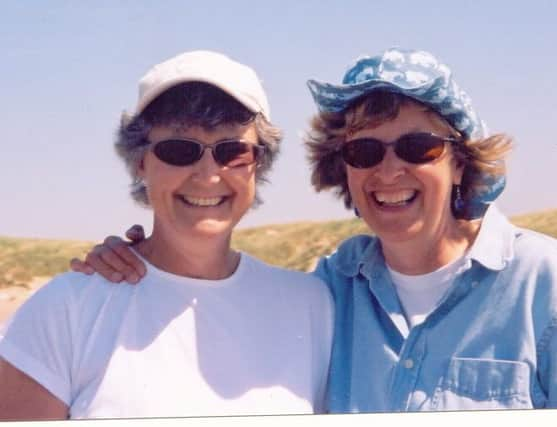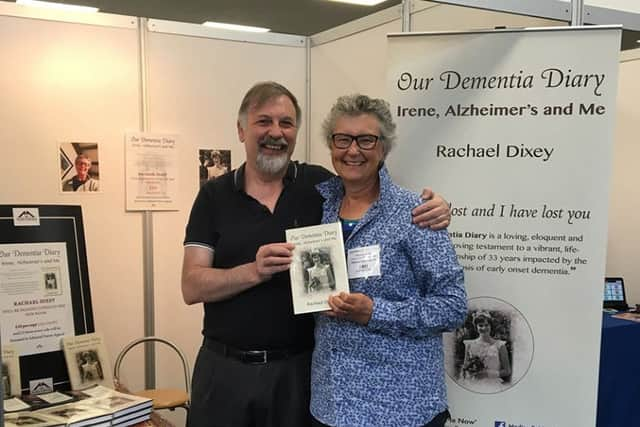How dementia took my Irene


Alzheimer’s came between us.
“It does that, drives you and the love of your life apart, going your separate ways because you cannot follow.”
So writes Rachael Dixey in the prologue to her book, Our Dementia Diary: Irene, Alzheimer’s and Me.


Advertisement
Hide AdAdvertisement
Hide AdIt tells the story of Rachael and her civil partner Irene, detailing Irene’s diagnosis and eventual loss to dementia.
Rachael and Irene met in1980, when Irene was a bubbly, funny and warmhearted young teacher and Rachael, seven years her junior, a budding academic specialising in health and development. The realisation of their love for each other came simultaneously and suddenly and led to a partnership that lasted half a lifetime. With a shared zest for life, they travelled widely, worked hard and expected to grow old together in their home in the north of England.
When Irene was only in her early 50s she started to falter. When she was finally diagnosed with early onset Alzheimer’s, Rachael looked after her for as long as possible at home. She continued working – a hard decision that turned out for the best.
Irene was diagnosed with early-onset Alzheimer’s at the age of 56 and the book tells movingly of the incredibly difficult and often devastating world they are thrown into afterwards. Based on Rachael’s journals, the memoir follows their journey with brutal honesty.


Advertisement
Hide AdAdvertisement
Hide AdRachael, a retired professor at Leeds Beckett University, was encouraged to write the book by Brian Daniels, a producer friend of the couple’s.
After seeing her diary, he asked to write a play based on it, which led to the production Don’t Leave Me Now.
Brian also encouraged Rachael, who lives near Pool-in-Wharfedale, to turn her journals into a book.
“If it had not been for him, there would be no book,” she said.
Advertisement
Hide AdAdvertisement
Hide AdCreating the book was in some ways therapeutic, she said, but also very tough.
“I put myself through a bit of a wringer and at times I did think ‘why am I writing this?”
But it was cathartic and also quite freeing to be able to write with such honesty.
“I had to write in my main job but it was so different, writing scientific papers, but with this it was quite easy – I could just write,” she added.
Advertisement
Hide AdAdvertisement
Hide Ad“It’s a different way of writing but it also feels very good. People respond to the book because it’s raw.”
However she was concerned about being so open and thought readers might “think I go round weeping all the time”.
In fact, including virtually every detail of their journey only serves to demonstrate her great strength.
Rachael hopes that the book may help others in similar situations, as though there are many publications on the subject of dementia, none were entirely relevant to her.
Advertisement
Hide AdAdvertisement
Hide Ad“I wished that I had had a book like this,” the 62-year-old said.
“I wished there had been something out there for me. Also it helps raise some of the LGBT issues and those around younger people with dementia.”
When, at crisis point, she had to make the agonising decision to move Irene to a care home, some of these issues came to the fore.
“Gay people are the same as everybody else, but sometimes we feel more comfortable in some situations than others,” Rachael said.
Advertisement
Hide AdAdvertisement
Hide Ad“I went to one care home and just did not feel comfortable in being out.
“The one I eventually chose was different again and I felt very comfortable. You do hear awful stories about the quality of care, but they were just brilliant.”
The book is also very much a love story about a couple who were together for more than three decades before Irene’s death at the age of 66.
That solid partnership is at the centre of the memoir – Rachael is the last person who Irene recognises, which she writes is a “privilege and a comfort”.
Advertisement
Hide AdAdvertisement
Hide Ad“I also want to help other people realise that gay and lesbian people love each other as much as anyone else.” she said.
She has had the odd strange comment – people asking whether she “misses” Irene, to which the answer is obvious.
“The book might change a few attitudes as well,” she added.
As she writes: “It makes no difference that we are a same-sex couple – our story is the same as any couple’s wherein love resides.
“Those lucky enough to have found a soul mate must inevitably suffer a loss.”